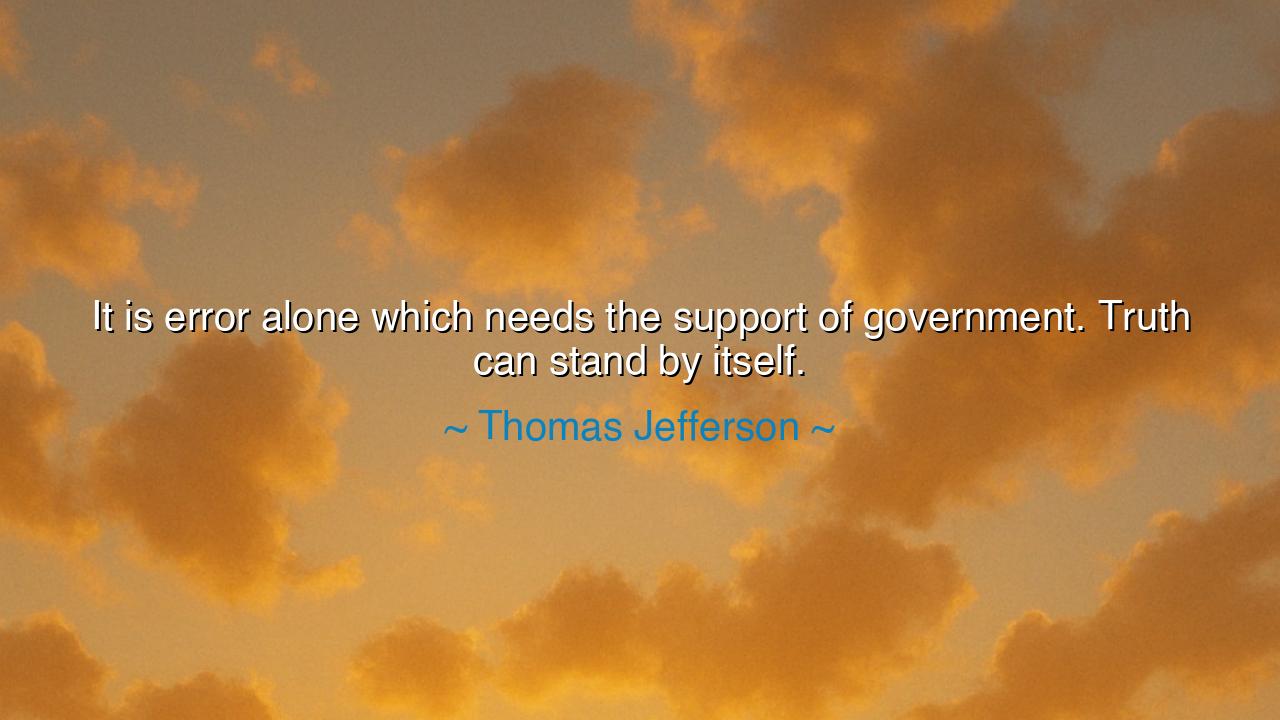
It is error alone which needs the support of government. Truth






"It is error alone which needs the support of government. Truth can stand by itself." These words from Thomas Jefferson resonate with timeless clarity, speaking to the very heart of freedom, truth, and the role of government. Jefferson, one of the founding fathers of the United States, understood the fundamental nature of truth—how it is, by its very essence, unshakable, undeniable, and self-sustaining. It does not require the weight of authority or the imposition of laws to defend it. Truth is a force that stands firm, even in the face of adversity, and its presence is its own defense. It is error, on the other hand, that thrives on support and protection from external forces, for it lacks the inherent strength to endure the scrutiny of a free and open society.
This concept is as old as the very pursuit of wisdom itself. In the ancient world, philosophers like Socrates and Plato spoke of truth as a divine force, one that could not be hidden or suppressed for long. Socrates famously said, “The unexamined life is not worth living.” In doing so, he highlighted the pursuit of truth—the honest examination of oneself and the world—as the highest goal. Truth requires no defense, for it exists independently, waiting to be discovered by those who seek it. But error, driven by ignorance or falsehood, is fragile and seeks to shield itself with lies, with laws, and with the weight of power.
Consider the fate of Galileo Galilei, the brilliant astronomer whose observations in the 16th century shattered the long-held belief that the Earth was the center of the universe. Galileo's truth was met with fierce opposition, not from reason or evidence, but from the Church, which sought to preserve its own error. Galileo was tried, forced to recant, and placed under house arrest. Yet, despite the oppressive forces that sought to suppress his findings, the truth of his discoveries—the heliocentric theory—could not be hidden. Truth, though temporarily silenced, endured, and ultimately, the scientific world embraced it. This historical example demonstrates how error requires the backing of authority, while truth cannot be denied forever.
Jefferson’s insight also speaks to the very nature of freedom in a society. In a free nation, it is the truth that thrives, for it has nothing to fear from open debate and the exchange of ideas. A government founded on truth does not need to control or suppress the voices of its citizens, for the truth will stand by itself. It is the errors—the falsehoods, the lies, and the corruptions—that require the support of government and power to maintain their grip on society. Totalitarian regimes throughout history have understood this, using laws, censorship, and force to protect their falsehoods and ideologies. The freedom to seek, express, and live by truth is the hallmark of a healthy, thriving society.
This lesson from Jefferson is not just a political one, but a personal one as well. It teaches us that in our own lives, we must seek truth above all else, for it is the foundation of personal integrity. Truth does not need to be defended; it simply needs to be recognized and honored. When we live in alignment with truth, we stand unshaken, even when faced with adversity. Lies and falsehoods may provide temporary shelter, but they can never stand against the unyielding strength of truth. To live with integrity is to live without fear, knowing that truth will always find its way to the surface.
The lesson, therefore, is one of courage and self-reliance. When faced with the errors of others—whether in the form of false beliefs, corrupt actions, or societal pressures—we must have the courage to stand firm in our convictions and trust in the truth that we know. Just as Jefferson and Galileo did, we too must resist the temptation to seek validation or support from external authorities when we know the truth. Rather than relying on power or authority to defend our beliefs, we must place our faith in the strength of truth itself.
In practical terms, this means that we must pursue truth relentlessly in our personal and professional lives. When we encounter errors, whether in the form of misinformation, misunderstandings, or distortions of reality, we must challenge them with the strength of knowledge, reason, and integrity. And when we are called upon to defend our beliefs, let us do so not with force or fear, but with the quiet confidence that truth requires no defense. Through this, we become not just defenders of truth, but living examples of it in action. In the end, as Jefferson knew, truth is the only foundation upon which a just and free society can be built.






AAdministratorAdministrator
Welcome, honored guests. Please leave a comment, we will respond soon